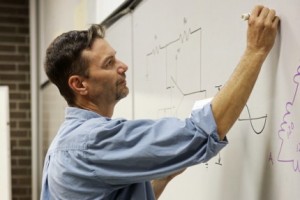 Either before or after graduating with a bachelor’s degree or after working in a non-educational field or industry, there are opportunities to consider for some professionals who are interested in how to become a teacher after majoring in engineering. By taking some additional steps, future educators can continue to train and prepare for working in elementary, secondary, or post-secondary classrooms.
Either before or after graduating with a bachelor’s degree or after working in a non-educational field or industry, there are opportunities to consider for some professionals who are interested in how to become a teacher after majoring in engineering. By taking some additional steps, future educators can continue to train and prepare for working in elementary, secondary, or post-secondary classrooms.
Becoming an Elementary School Teacher
Choosing to become an elementary teacher after majoring in engineering will require a significant amount of additional course work. This path will require completion of an elementary or primary education degree program. While general education credits are likely to count toward the second degree, engineers-turned-future-educators will also need to complete courses in methods of teaching, child development, literacy and learning, knowledge acquisition, diversification of learning instruction, classroom management, and many others. Courses are then completed to prepare for student teaching, which is the final step before completing testing and other certification requirements to become a teacher after majoring in engineering.
Teaching in Secondary Education Classrooms
Depending on the state, secondary education might include grades seventh through twelfth. For engineering majors who choose the path for beginning a career as a secondary teacher, most states offer certification through fast-track programs. In these programs, future educators are required to complete course work in methods of teaching before beginning the completion of the required field work, observation, and student teaching courses. Many of these programs can be completed in as little as one year, depending on state requirements.
Becoming a College Instructor
Engineering majors who are interested in beginning to teach without completing additional course work can also consider positions in colleges and universities. For most of these post-secondary institutions, no formal degree or course work in the education field is required. In fact, most often, these institutions prefer for instructors to have discipline-specific knowledge in one area, along with work experience. For most universities, a minimum of a master’s degree, however, will be required. Some community colleges might also prefer or require candidates for instructor positions to complete a graduate degree.
State Licensing and Certifications
Whether pursuing future positions in elementary or secondary teaching, additional certifications and licensing will be required through state boards. More information on these individual state requirements can be found by visiting state government websites. Various colleges and universities will also have different requirements for instructors, and licensing or certification in teaching might also be a qualification or preference at these institutions.
Additional information on other non-traditional alternatives for obtaining certification in order to teach can be reviewed on the National Education Association website.
Related Resource: Become an Education Policy Advocate
The personal and professional rewards and satisfaction that teaching offers is a major factor in many professionals’ decisions to enter into the field. Whether deciding to change paths before graduation or to return to school to gain the additional qualifications needed for certification, there are many options for future educators to consider for how to become a teacher after majoring in engineering.
Be the first to comment